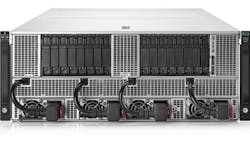The promise of artificial intelligence (AI) for the manufacturing and processing industries has been discussed for several years now. And we’re seeing its application in a wide variety of areas, from industrial cybersecurity to robotics. However, outside of pre-packaged systems where AI plays a role as an embedded component, the direct use of AI technology for production optimization still seems relegated to the biggest industrial companies with the deepest pockets and technical resources.
In an effort to bring AI to industry in a broad manner, Hewlett Packard Enterprise (HPE) recently announced three new products and services designed to “help customers ramp up, optimize and scale AI usage across business functions to drive outcomes such as better demand forecasting, improved operational efficiency and increased sales.”
“Global tech giants are investing heavily in AI, but the majority of enterprises are struggling both with finding viable AI use cases and with building technology environments that support their AI workloads. As a result, the gap between leaders and laggards is widening,” said Beena Ammanath, global vice president, artificial intelligence, HPE Pointnext.
The HPE AI products and services just announced to help close the gap to which Ammanath refers include:
- HPE Digital Prescriptive Maintenance Services. HPE says these services are the first in a series of AI-enabled industry offerings from HPE Pointnext, which automates problem prevention and increases productivity of industrial equipment;
- HPE Apollo 6500 Gen10 System. HPE refers to this as its “next-generation high-performance computing system purpose-built for deep learning that delivers a 3x faster model training than previous generations;”
- HPE Artificial Intelligence Transformation Workshop. To help more knowledgeable users apply AI technology, HPE Pointnext will provide consulting expertise to “help customers get started with AI, evolve their strategic data and analytics initiatives and prioritize AI use cases.”
Describing its Digital Prescriptive Maintenance Services, HPE explains that, whereas predictive maintenance detects when industrial equipment is likely to fail, prescriptive maintenance predicts, suggests and automates the right action to fix the problem before it causes harm. This service, according to HPE, combines HPE Pointnext services such as consulting, proof of value and implementation with technologies and reference architectures from HPE and select partners.
“Based on both supervised learning for failure prediction and unsupervised learning for anomaly detection, HPE Digital Prescriptive Maintenance prescribes and automates actions to prevent industrial equipment failure and optimize its productivity,” according to HPE.
At the core of any AI application is data—lots of data. Therefore, fast processing of massive amounts of data is critical to any effective application in AI. This aspect of AI is what has often relegated it to use by only the largest companies. HPE’s Apollo 6500 Gen10 enterprise platform for accelerated computing is said to “dramatically accelerate time to value with deep learning applications.”
Training a deep learning model for AI is “an iterative process that requires high-performance graphics processing unit (GPU) accelerators running in parallel architectures that handle multiple tasks simultaneously,” says HPE to explain its work with NVidia around the HPE Apollo 6500 Gen10 System. “With support for eight NVidia Tesla V100 GPUs, Apollo 6500 Gen10 delivers dramatic increases in application performance, enabling a 3x faster model training than previous generations,” HPE claims.
HPE says it collaborated with NVidia to “embed the high-bandwidth, energy-efficient NVidia NVLink interconnect into HPE Apollo 6500 Gen10, enabling ultra-fast communication between GPUs. This technology allows data sharing at rates of up to 10x faster than the traditional PCIe Gen3 interconnect.”
The workshops HPE introduced as part of its AI announcement are, what the company calls, “highly interactive one-day workshops, [where] HPE Pointnext AI experts work with the customer’s business and technology decision makers to assess their data and advanced analytics needs and create a tailored, high-level plan to accelerate the AI exploration phase towards a set of AI use case implementations.”

